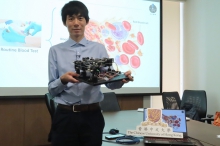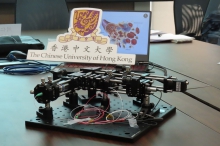News Centre
CUHK Showcases World’s First AI-enabled Portable Quantitative Phase Microscope for Blood Testing at the Hong Kong Electronics Fair
The world’s first “AI-enabled Portable Quantitative Phase Microscope for Blood Testing” is one of the five innovative projects to be showcased by The Chinese University of Hong Kong (CUHK) in the coming Hong Kong Electronics Fair (Autumn Edition) 2019 at the Hong Kong Convention and Exhibition Centre from 13 to 16 October. This project is able to provide low-cost, fast and high efficiency blood testing technology in general clinics and underdeveloped areas.
In general, a regular body check must include blood testing, which reveals the health condition, especially the immune-functioning leukocyte / white blood cell. Unlike the red blood cell, there are many types of leukocyte, including monocytes, granulocytes and lymphocytes. Through the classification or counting of the number of leukocytes to see if they have increased or decreased, different diseases can also be reflected, such as inflammation, infectious diseases and leukemia.
Traditional blood testing methods include manual observation of stained smears and fluorescence detection via flow cytometry, but the staining and fluorescent labeling process is time consuming and labour intensive. Quantitative Phase Microscopy (QPM) is a label-free imaging technology that has high imaging sensitivity and speed, but the instruments based on it are bulky and expensive and cannot be moved easily to different laboratories, especially in remote areas. Moreover, all of the above methods need to be handled by professionals, and the test results can take hours or even days. Therefore, in addition to the high costs of instruments and reagents, the labour and time costs should also be taken into consideration. Even though, currently, there are newer automated instruments, they still have the problems of bulk and expense, and may kill the cells and affect the morphology of the cells through staining or labeling. Such cells cannot be reused in other tests which may be able to reflect the health condition. Thus, a blood testing method that can be performed quickly, efficiently and can preserve cell morphology is needed.
In order to provide low-cost and high efficiency blood testing technology in general clinics and underdeveloped areas, the CUHK team led by Professor Zhou Renjie, Department of Biomedical Engineering, developed the “AI-enabled Portable Quantitative Phase Microscope for Blood Testing” to identify different types of human leukocytes based on quantitative phase imaging and deep learning.
The QPM technology has become an important modality for quantifying live cell morphology and precision material (e.g. semiconductor) metrology. Professor Zhou’s research team has successfully developed a new portable and versatile QPM system. By combining both reflection mode and transmission mode into one system, and using a special interferometry technique to greatly eliminate noise influence, the system is not only compact and portable, but also high precision and low cost.
Professor Zhou said, “In the past, researchers have tried to combine artificial intelligence with traditional blood testing methods but in vain, because it is difficult to distinguish cell images. Through our high-precision QPM technology, we can effectively combine it with the deep learning technology of artificial intelligence. By learning the morphological features from thousands of cells in two-dimensional quantitative phase images, our learning model can automatically distinguish monocytes, granulocytes, T-cells and B-cells in lymphocytes from healthy volunteers’ blood samples.”
The low-cost “AI-enabled Portable Quantitative Phase Microscope for Blood Testing” developed by CUHK weighs less than five kilograms and is a size similar to a briefcase that can be carried to use everywhere. In addition, its label-free feature not only saves the use of reagents, but can also avoid the staining and fluorescent labeling process by the professional, and the classification and counting of cells by clinical experts. The analysis process is completed by the computer automatically, so it can quickly obtain the result, in a matter of minutes, with over 90% accuracy.
The CUHK team has just completed the proof-of-concept study. The researchers are planning to get clinical certification by working with hospitals starting in 2020. They expect the low-cost “AI-enabled Portable Quantitative Phase Microscope for Blood Testing” will be commercialised after three to five years. In future, the researchers will develop other artificial intelligence models of this portable quantitative phase microscopy technique that can be used to distinguish red blood cells and all other blood cell types. They are also working on using such invention for differentiating bacteria and stem cells. Eventually, the team hopes to detect cancer cells in peripheral blood.
Comparisons of blood testing instruments
| Key Features | Current blood testing method [1,2] | CUHK blood testing method |
| Marker Type | Chemical type: Scattered light, impedance and conductivity | Physical type: Optical path length difference |
| Invasiveness of cell | Yes | No |
| Throughput | 100 samples/hour | >10,000 cells/second |
| Accuracy | >90% | >90% |
| Cost | >US$80,000 | >US$30,000 |
| Consumable Expense | Yes | No |
| Weight | >100kg | |
| Size | >60×80×70cm |
Reference:
[1] https://www.beckmancoulter.com/en/products/hematology/dxh-600?index=0#/documents
[2] Meintker, Lisa, et al. “Comparison of automated differential blood cell counts from Abbott Sapphire, Siemens Advia 120, Beckman Coulter DxH 800, and Sysmex XE-2100 in normal and pathologic samples.” American journal of clinical pathology 139.5 (2013): 641-650.
To know more about the aforementioned technology and other recent technological projects, please visit the booth of CUHK at the Hong Kong Electronics Fair (Autumn Edition).
Hong Kong Electronics Fair (Autumn Edition)
Date: 13-16 October 2019
Time: 9:30 am – 6:30 pm (Closes at 5:00 pm on 16 October)
Venue: Hong Kong Convention and Exhibition Centre Hall 1A Concourse (CUHK Booth No.: 1CON-050).



